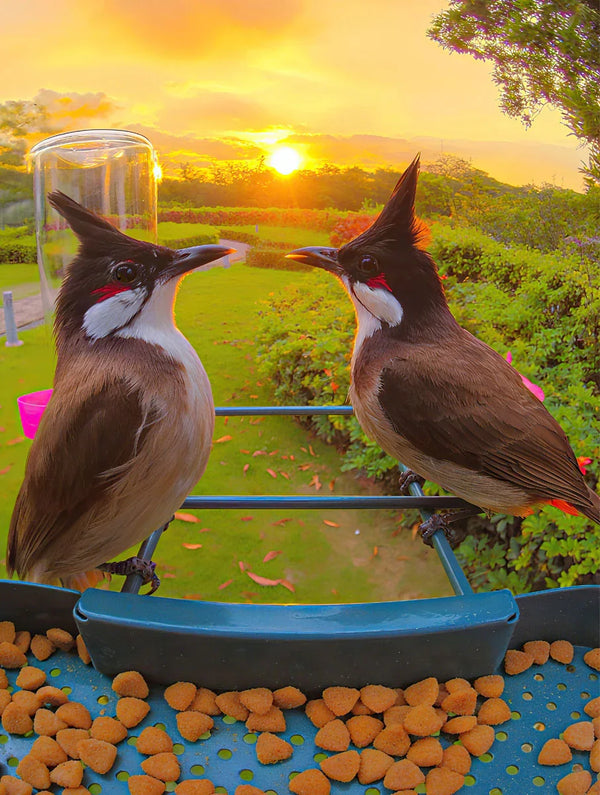Discover the Secret to Happy Parrots: The Ultimate Bird Feeder You Need!
Feeding your parrot is not just about filling a bowl with seeds; it’s a crucial aspect of their overall health and happiness. Proper nutrition plays a significant role in a parrot’s well-being, affecting everything from their plumage to their behavior. As a parrot owner, I’ve learned that providing the right food in the right way is essential. This is where a specialized bird feeder designed for parrots comes into play. Unlike standard bird feeders, these feeders cater specifically to the unique needs of parrots, enhancing their feeding experience and encouraging healthier eating habits. In this guide, we will explore why investing in a parrot bird feeder is a game-changer for both you and your feathered friend.

Understanding Parrot Feeding Habits
Parrots are naturally foragers, often spending hours in the wild searching for food. Their feeding habits are deeply rooted in their instincts, which include a diet rich in fruits, seeds, nuts, and vegetables. Parrots also thrive on social interaction during feeding times, often eating in groups. This social aspect is crucial as it not only provides them with nourishment but also strengthens their bonds with other birds. When considering a bird feeder for your parrot, it’s vital to replicate these natural behaviors. A suitable feeder should allow for easy access to food, mimicking the foraging experience and encouraging your parrot to engage in their natural feeding dynamics. By understanding these behaviors, you can choose a feeder that will keep your parrot stimulated and satisfied.
Features of an Ideal Parrot Bird Feeder
When selecting a bird feeder specifically for parrots, certain features should be prioritized to meet their unique needs. First and foremost, size matters; a feeder should be spacious enough to accommodate various food types and allow multiple parrots to feed simultaneously. The material is also essential; opt for feeders made from durable, non-toxic materials that can withstand the beaking and chewing tendencies of parrots. Accessibility is another critical feature; feeders should be designed so parrots can easily reach the food without frustration. Additionally, consider a design that minimizes waste and mess, such as those with trays to catch fallen seeds. By focusing on these essential features, you can ensure that your parrot has a comfortable and enjoyable feeding experience.
Benefits of Using a Parrot-Specific Bird Feeder
Investing in a bird feeder designed specifically for parrots offers numerous benefits that extend beyond mere convenience. One of the primary advantages is improved feeding habits; a well-designed feeder encourages parrots to eat a balanced diet rather than picking out their favorite seeds. This leads to better nutrition and overall health. Additionally, specialized feeders can reduce mess and waste, as they are often constructed to contain spills and crumbs more effectively. Another significant benefit is enhanced social interaction; a feeder that accommodates multiple birds fosters a shared feeding experience, allowing your parrots to engage with each other, which is essential for their emotional well-being. These benefits make a parrot-specific bird feeder a worthwhile addition to your pet care routine.
Choosing the Right Location for Your Bird Feeder
The placement of your parrot bird feeder is just as important as the feeder itself. For optimal accessibility, choose a location that is easily reachable for your parrots. Consider their safety as well; avoid areas where they might feel threatened or exposed to predators. Environmental factors play a crucial role as well; placing the feeder in a shaded area protects food from direct sunlight, which can spoil it, while also providing your parrots with a comfortable environment. Additionally, consider their view; parrots enjoy watching their surroundings, so positioning the feeder where they can observe their environment can enhance their feeding experience. By carefully selecting the right location, you can create a safe and enjoyable dining area for your parrots.
Maintaining Your Parrot Bird Feeder
To ensure the longevity and hygiene of your parrot bird feeder, regular maintenance is essential. Cleaning should be a routine task, ideally done weekly, to prevent the buildup of bacteria and mold that can harm your birds. Use a mild soap solution and warm water to scrub the feeder, ensuring all food residues are removed. Additionally, regularly check for wear and tear, particularly in parts that may be chewed or damaged by your parrots. Ensuring that the feeder remains in good condition not only extends its life but also keeps your parrots safe and healthy. A well-maintained feeder reflects your commitment to your birds' well-being and enhances their feeding experience.
Enhancing Parrot Feeding Experience
Choosing the right bird feeder for your parrots is a decision that impacts their health and happiness significantly. From understanding their natural feeding habits to selecting a feeder with the right features, every aspect plays a role in enhancing their feeding experience. A parrot-specific bird feeder not only promotes better nutrition and reduces mess but also encourages social interaction, which is vital for their emotional well-being. By taking the time to select and maintain an appropriate feeder, you contribute to the overall happiness and longevity of your feathered companions. Happy feeding!










Comments